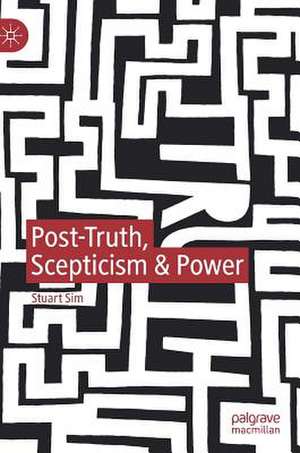Post-Truth, Scepticism & Power
Autor Stuart Simen Limba Engleză Hardback – 11 apr 2019
Preț: 497.64 lei
Preț vechi: 585.46 lei
-15% Nou
Puncte Express: 746
Preț estimativ în valută:
95.23€ • 103.41$ • 79.100£
95.23€ • 103.41$ • 79.100£
Carte tipărită la comandă
Livrare economică 23 aprilie-07 mai
Preluare comenzi: 021 569.72.76
Specificații
ISBN-13: 9783030158750
ISBN-10: 3030158756
Pagini: 201
Ilustrații: VII, 175 p. 1 illus.
Dimensiuni: 148 x 210 mm
Greutate: 0.37 kg
Ediția:1st ed. 2019
Editura: Springer International Publishing
Colecția Palgrave Macmillan
Locul publicării:Cham, Switzerland
ISBN-10: 3030158756
Pagini: 201
Ilustrații: VII, 175 p. 1 illus.
Dimensiuni: 148 x 210 mm
Greutate: 0.37 kg
Ediția:1st ed. 2019
Editura: Springer International Publishing
Colecția Palgrave Macmillan
Locul publicării:Cham, Switzerland
Cuprins
1. Introduction: Truth Will Out?.- 2. The Post-Truth Landscape.- 3. The Pre-History of Post-Truth.- 4. Faith, Truth and Post-Truth in Religious Belief.- 5. Philosophical Scepticism and its Arguments for Relativism.- 6. Postmodern Relativism: Jean François Lyotard Versus Jacques Derrida.- 7. 'Truth Within a Fable'?: Fiction, Truth and Post-Truth.- 8. A Post-Liberal Society?.- 9. Conclusion: Countering Post-Truth.
Recenzii
“The book is overall interesting and informative to read. ... Post-Truth, Scepticism & Power is a good read for people interested in gaining insight into post-truth.” (Anne Braune, KULT_online - Review Journal for the Study of Culture, Issue 62, November, 2020)
Notă biografică
Stuart Sim retired as Professor of Critical Theory at Northumbria University, 2013. He is widely published in the fields of critical theory, philosophy, and literary studies, and is a Fellow of the English Association. Recent publications include The Edinburgh Companion to Critical Theory (ed., 2016) and Twenty-First Century Puritanism (2018).
Textul de pe ultima copertă
"Professor Sim clearly cares for the truth; his is a patient exploration of the phenomenon of post-truth, and a rigorously argued defence of the political and philosophical virtues of holding to the truth. He traces the history of post-truth, following the interweaving discourses of fact, faith, fiction, rhetoric, truth and lies to drill down into the complex motivations underpinning the toxic ideology of post-truth. His book is a powerful plea for truth, rationally persuasive, enlightened and enlightening."
— Keith Crome, Department of History, Politics and Philosophy, Manchester Metropolitan University, UK
This book examines the concept of post-truth and the impact it is having on contemporary life, bringing out both its philosophical and political dimensions. Post-truth is contextualised within the philosophical discourse of truth, with particular reference to theories of scepticism and relativism, to explore whether it can take advantage of these to claim any intellectual credibility. Sim's argument is that post-truth cannot be defended on either sceptical or relativistic grounds – even those provided by recent iconoclastic philosophical movements such as poststructuralism and postmodernism.The affinity between post-truth and conspiracy theory is emphasised, and the extent to which post-truth plays a role in religious doctrine is also considered. Post-truth is seen to constitute a threat to liberal democratic ideals and our Enlightenment heritage, raising the question of whether we are moving into a post-liberal age where the far right would hold power. To prevent this, post-truth urgently needs to be countered.
This book examines the concept of post-truth and the impact it is having on contemporary life, bringing out both its philosophical and political dimensions. Post-truth is contextualised within the philosophical discourse of truth, with particular reference to theories of scepticism and relativism, to explore whether it can take advantage of these to claim any intellectual credibility. Sim's argument is that post-truth cannot be defended on either sceptical or relativistic grounds – even those provided by recent iconoclastic philosophical movements such as poststructuralism and postmodernism.The affinity between post-truth and conspiracy theory is emphasised, and the extent to which post-truth plays a role in religious doctrine is also considered. Post-truth is seen to constitute a threat to liberal democratic ideals and our Enlightenment heritage, raising the question of whether we are moving into a post-liberal age where the far right would hold power. To prevent this, post-truth urgently needs to be countered.
Caracteristici
Contextualises post-truth and 'fake news' within the philosophical discourse of truth Explores the threat of a politics based on post-truth on the tradition of liberal democracy Provides a rigorous defence of the political and philosophical virtues of holding to the truth
